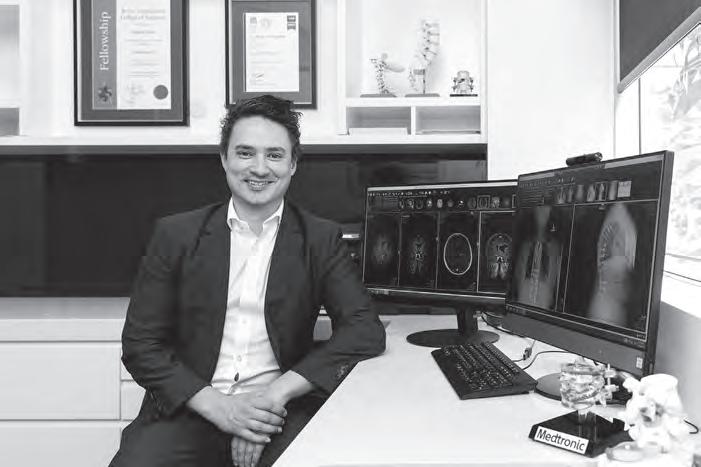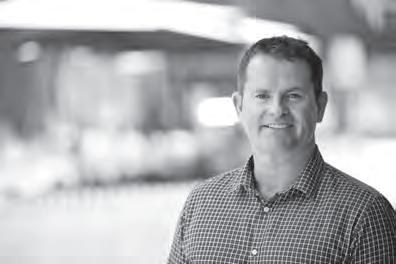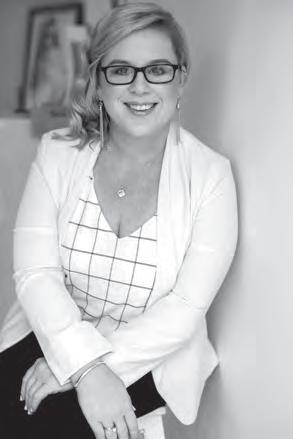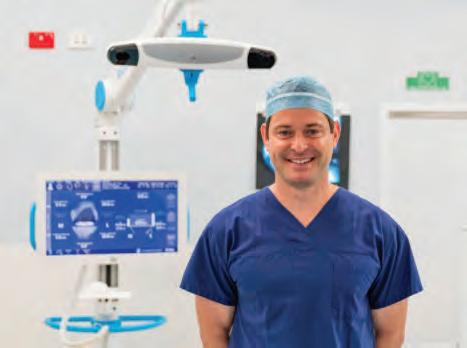
8 minute read
INDUSTRY EXPERTS
PENSION HELP
Just one more stress driven job
There are jobs that are just annoying. You tend to put them off or grudgingly complete as required. For me, it’s the maintenance in the garden that gets in the way of doing the creative work I love. That means the lawns, so we engage a lawn mower.
House cleaning is another, although we do tend to grin and bear it. Those years I had a cleaner made life just that bit less cumbersome.
What about Centrelink, keeping your details updated and your payment correct, a stress-driven chore?
I regularly meet clients who have not updated their details for years, only to find that they have not been receiving the correct payment.
The process of explaining to Centrelink where the funds came from or went to, is exhausting.
For less than $6 a week (less than the gardener or cleaner) CAPA Services will monitor and maintain your Centrelink payment and records.
CAPA Services has service packages structured to meet the varying needs of clients.
Further information is just a telephone call away.


NARELLE COOPER
DIRECTOR CAPA SERVICES CENTRE FOR AGE PENSION ADMIN SERVICES 07 5354 0144 OR 1300 043 197 ADMIN@CAPASERVICES.COM.AU

LEGAL

Is my “home made” will enough?
This is the fifth in our series answering questions about estate and probate disputes.
I am often asked whether a “home made will” is sufficient to do the job. It is a question that troubles me.
Maybe it is sufficient if: • you prepare it correctly; • the drafting is clear; • it caters for various scenarios; • it has been correctly executed; and • it can actually be located after you die
Why I am troubled by being asked this question is because people seem oblivious to the consequences of getting it wrong.
The days of a simple will are long gone.
An estate plan always involves consideration of: • how assets are owned; • what obligations are owed to provide for family members; and • a beneficiary dying before you.
Sadly, I have seen all too often the costly consequences of errors where people have tried to do their estate planning without legal advice.
The costs of court applications to fix mistakes far outweigh the savings of doing things yourself.
See krugerlaw.com.au to learn more.
TRENT WAKERLEY PARTNER, KRUGER LAW LEVEL 4, OCEAN CENTRAL, OCEAN STREET, MAROOCHYDORE 5443 9600, KRUGERLAW.COM.AU
NEUROSURGERY

Advances in neurosurgery
The modern operating theatre looks very different compared with other areas of the hospital or GP surgeries that patients often visit. Powerful microscopes, computer navigation and robots have replaced the old, clunky pieces of equipment that were previously used to perform operations to make surgery more streamlined than ever.
Neurosurgeons have always been at the forefront of adopting new, safer technologies to allow operations to be performed in the most delicate areas of the brain and spine. Luckily, most patients will never need the services of a specialist neurosurgeon as most cases of pins and needles, sciatica and the feeling of ‘electric shocks’ in the arm or leg settle with time and following the advice of your GP.
For those unlucky enough to have ongoing pain issues, treatment can be undertaken locally at the modern Sunshine Coast University Private Hospital using cutting-edge techniques to get you going and enjoying life again.
Any surgical or invasive procedure carries risks and before proceeding, you should seek the advice of your doctor.
DR STEPHEN BYRNE SUNSHINE COAST NEUROSURGERY SUITE 17, SUNSHINE COAST UNIVERSITY PRIVATE HOSPITAL, 3 DOHERTY STREET, BIRTINYA. PHONE: 5437 7256 SCNEUROSURGERY.COM.AU
AGED CARE

Covid no time to cancel care services
If you or a family member have stopped receiving home care services fearing contracting Covid, I urge you to reconsider.
The risk of contracting the virus while receiving home care is minimal and needs to be weighed against the risk of not getting the help you need.
Slipping in the shower, forgetting to take your medication and cancelling your nurse’s home visit, can compromise your health.
If you have concerns about your service, pick up the phone and ask some questions. Here are five ways many home care services have adapted to life under Covid: 1. Limiting the number of carers who visit, by giving multiple shifts to the same carer. 2. Services have set up infection control protocols and trained care staff in these. 3. Shopping online and getting groceries home-delivered. 4. Use telehealth through Skype calls. 5. Social isolation can lead to depression and a higher risk of mental decline. Home care services are focused on the whole person. A carer’s visit is an opportunity to talk or share a joke as well as to attend to the basics.
KENDALL MORTON DIRECTOR, HOME CARE ASSISTANCE SUNSHINE COAST 42 BULCOCK STREET, 5491 6888 HOMECAREASSISTANCESUNSHINE COAST.COM.AU
INDUSTRY EXPERTS
ORTHOPAEDIC LIFE STYLE VILLAGES

When is it time for a joint replacement?
Patients with symptomatic hip and knee osteoarthritis will often ask me if they should have joint replacement surgery.
This decision comes down to a balance of risk versus benefit. Considerations in this analysis include the severity of the pain, the impact on their quality of life, activity profile, age, other health problems as well as having appropriate attempts to manage the problem non-operatively.
If the potential risks are higher than the potential benefits, I will inform patients they are not a candidate for surgery. We will then have a long conversation about the non-operative measures they can take to improve their quality of life.
When patients are a candidate for joint replacement surgery, I always present the non-operative options as well as inform them about the risks and benefits of the surgery.
It is never for me to tell patients when it is the right time to have elective surgery. This is an intensely personal decision with so many factors. Only the patient knows when the time is right.

DR DAEVYD RODDA SUNSHINE COAST ORTHOPAEDIC GROUP SUNSHINE COAST UNIVERSITY PRIVATE HOSPITAL, SUITE 12, 3 DOHERTY STREET, BIRTINYA, 5493 8038 SCORTHOGROUP.COM.AU

Clearing up the misconceptions
1. It’s for older people. Over 50s lifestyle villages are active independent living and an alternative to retirement villages. Some residents still work. Early retirees and Baby Boomers are attracted to the pack up and go options available. Often they sell their homes and free up money for lifestyle, buy the RV or caravan and hit the road knowing their home is in a safe environment where there is no need to worry about the grass being mowed and the garden maintained. 2. You don’t own the land. But you get all the capital gain when you sell! You own the home outright and and have a lease on the land which has a start date but no end date, so although you don’t own the land you have the right to use it indefinitely. In the over 50s lifestyle villages the value is in not owning the land. If you did, you would have to sell it to anybody and then you would have families and children and rentals arriving as well. 3. Rules Most people living in over 50s villages like the idea of rules which protect their investment. For example, you can’t paint murals on walls or paint your home pink or purple which can devalue the value of the home when it comes time to sell.
Most of the rules are common sense and are there for your own protection.
LYN MORRISON
LIFESTYLE AND RETIREMENT ADVISOR AFFINITY LIFESTYLE RESORT 0431 483 388, LYNM62@OUTLOOK.COM
FINANCIAL ADVICE

Stay in control with a frailty plan
Last year we had a taste of what it is like to lose some independence and be confined at home; a time when it was difficult to go out and see the doctor or do the groceries without planning ahead.
But what if the reason was not an international pandemic and was not affecting everyone in your street, but only you? What if it was due to your own frailty?
With the potential for frailty (on average) to span 20 per cent of our retirement years, we need a plan.
Having a plan can set you up to have choices and more control so you can maintain as much independence as possible.
If frailty creeps up and you have not planned ahead, you might find yourself herded down a path based on the bias and the goals — no matter how wellintentioned — of the person who first says “I can help”.
A plan gives you time to consider your preferred choices and be prepared. This may allow you to: • Ensure your home is modified and ready to continue living there. • Have your support teams in place. • Take away some of the stress and uncertainty from your family. • And most importantly, have the finances ready to pay for the support you need to ensure not only quality of care, but also quality of lifestyle.
But not everything always goes our way or how we planned. This is why planning is important. You can add contingency measures and decision pathways into your plan.
So how do you get started?
Don’t do it alone. It is too hard to be objective. Ask your financial planner for help.
This is what they are good at … planning.
KELLY BRADY
POOLE GROUP ACCOUNTANTS & INVESTMENT ADVISERS STOCKLAND HOUSE, LEVEL 1, 8 INNOVATION PARKWAY, BIRTINYA. 5437 9900, POOLEGROUP.COM.AU










